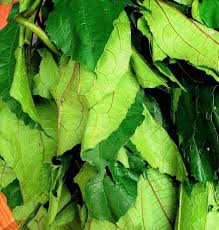Ugu leaf, scientifically known as Telfairia occidentalis, is a nutrient-rich vegetable commonly found in West Africa. Known for its vibrant green color and unique flavor, Ugu leaf is often used in various traditional dishes, particularly soups and stews.
This leafy vegetable is celebrated not only for its culinary uses but also for its numerous health benefits, making it a staple in many households. Rich in essential vitamins, minerals, and antioxidants, Ugu leaf contributes significantly to overall health and well-being.
One of the most remarkable features of Ugu leaf is its high nutrient content. It is an excellent source of vitamins A and C, both of which play crucial roles in maintaining healthy skin, boosting the immune system, and supporting good vision.
Vitamin A is vital for the functioning of the eyes and helps to prevent night blindness, while vitamin C is essential for the growth and repair of tissues, as well as the absorption of iron from plant-based sources. Additionally, Ugu leaf contains vitamins B1, B2, and B3, which are important for energy production and metabolism.
In terms of minerals, Ugu leaf is rich in calcium, magnesium, iron, and potassium. Calcium is necessary for maintaining strong bones and teeth, while magnesium plays a key role in muscle function and energy production.
Iron is crucial for the formation of red blood cells and the prevention of anemia, especially in individuals who may have a higher risk, such as pregnant women and children. Potassium helps regulate blood pressure and supports proper heart function, making Ugu leaf a heart-healthy addition to the diet.
The antioxidant properties of Ugu leaf further enhance its health benefits. Antioxidants help combat oxidative stress in the body, reducing the risk of chronic diseases such as cancer and heart disease.
The presence of flavonoids and phenolic compounds in Ugu leaf contributes to its anti-inflammatory effects, which can help alleviate symptoms associated with inflammatory conditions. This makes Ugu leaf not only a delicious addition to meals but also a valuable ally in promoting long-term health.
Moreover, Ugu leaf is a great source of dietary fiber, which aids in digestion and helps maintain a healthy gut. Consuming fiber-rich foods can promote regular bowel movements, reduce the risk of constipation, and support overall digestive health.
This is particularly important in today’s fast-paced world, where digestive issues are increasingly common due to poor dietary habits. Including Ugu leaf in meals can be a simple and effective way to boost fiber intake.
Nutritional Profile of Ugu Leaf

Ugu leaf, also known as fluted pumpkin leaf (Telfairia occidentalis), is highly valued in many parts of Africa for its rich nutritional content. Here’s a breakdown of its nutritional profile:
1. Vitamins: Ugu leaves are rich in vitamins, particularly vitamin A, which is essential for maintaining healthy vision, skin, and immune function. They also contain vitamin C, which supports the immune system and aids in collagen production.
2. Minerals: These leaves are a good source of important minerals such as calcium, iron, and magnesium. Calcium is vital for bone health, while iron is crucial for red blood cell production and preventing anemia. Magnesium plays a role in numerous biochemical reactions in the body.
3. Fiber: Ugu leaves are high in dietary fiber, promoting healthy digestion and helping to regulate blood sugar levels.
4. Calories: Ugu leaves are low in calories, making them a healthy addition to meals for weight management.
Rich Source of Vitamins and Minerals
Ugu leaves are renowned for their dense vitamin and mineral content:
1. Vitamin A: Crucial for vision, immune function, and skin health. A diet rich in vitamin A can help prevent vision-related issues and support overall health.
2. Vitamin C: Acts as an antioxidant and supports immune health. It helps in the absorption of iron from plant sources and contributes to the maintenance of skin, blood vessels, and cartilage.
3. Iron: Essential for the production of hemoglobin, which carries oxygen in the blood. Iron-rich foods are particularly important for women, children, and individuals with anemia.
4. Calcium: Important for strong bones and teeth, as well as for muscle and nerve function.
5. Magnesium: Supports muscle function and energy production, and it also plays a role in maintaining normal blood pressure.
Antioxidant Properties
Ugu leaves possess significant antioxidant properties due to their high content of vitamins and phytochemicals.
1. Protection Against Free Radicals: The antioxidants in ugu leaves help neutralize free radicals in the body, reducing oxidative stress and lowering the risk of chronic diseases.
2. Anti-Inflammatory Effects: The anti-inflammatory properties can help reduce inflammation in the body, potentially lowering the risk of conditions such as arthritis and heart disease.
3. Overall Health Benefits: Regular consumption of antioxidant-rich foods like ugu leaves may contribute to improved health outcomes, including reduced risk of cancer and heart disease.
Read Also: 15 Medicinal Health Benefits Of Echinacea purpurea (Purple Coneflower)
Benefits for Eye Health

Ugu leaves offer numerous benefits for maintaining good eye health:
1. Rich in Carotenoids: The presence of carotenoids, particularly beta-carotene, in ugu leaves is beneficial for eye health. Carotenoids can convert to vitamin A in the body, which is essential for proper vision.
2. Prevention of Vision Problems: Regular intake of vitamin A can help prevent night blindness and other vision-related issues. It also plays a role in maintaining healthy mucous membranes in the eyes.
3. Protection Against Macular Degeneration: The antioxidants in ugu leaves may help reduce the risk of age-related macular degeneration, a leading cause of vision loss in older adults.
Support for Digestive Health
Ugu leaves provide several benefits for digestive health:
1. High Fiber Content: Ugu leaves are rich in dietary fiber, which aids in digestion by promoting regular bowel movements and preventing constipation. Fiber also helps in maintaining a healthy gut microbiome.
2. Detoxification: The fiber and water content in ugu leaves assist in flushing out toxins from the digestive tract, promoting overall gut health.
3. Reduction of Digestive Disorders: Regular consumption of ugu leaves may help alleviate symptoms of digestive disorders such as bloating and irritable bowel syndrome (IBS), contributing to better digestive comfort.
Anti-Inflammatory Effects
Ugu leaves exhibit notable anti-inflammatory properties:
1. Phytochemical Compounds: The presence of various phytochemicals, such as flavonoids and phenolic compounds, in ugu leaves helps combat inflammation in the body.
2. Support for Chronic Conditions: By reducing inflammation, ugu leaves may play a role in preventing chronic diseases associated with inflammation, including heart disease and diabetes.
3. Joint and Muscle Health: Incorporating ugu leaves into the diet may help alleviate joint pain and discomfort due to their anti-inflammatory effects.
Read Also: The Health Benefits of Using Birds Eye Chilli on your Cooking
Role in Blood Sugar Regulation

Ugu leaves can positively impact blood sugar levels:
1. Low Glycemic Index: Ugu leaves have a low glycemic index, making them a suitable food choice for individuals looking to manage blood sugar levels.
2. Nutrient-Rich Composition: The vitamins and minerals found in ugu leaves may help enhance insulin sensitivity, promoting better glucose metabolism.
3. Management of Diabetes: Regular consumption of ugu leaves may assist in preventing spikes in blood sugar levels, contributing to effective diabetes management.
Contribution to Bone Health
Ugu leaves are beneficial for maintaining bone health:
1. Rich in Calcium: The high calcium content in ugu leaves supports bone density and strength, reducing the risk of osteoporosis and fractures.
2. Magnesium and Phosphorus: In addition to calcium, ugu leaves contain magnesium and phosphorus, both of which are essential for bone health and proper bone formation.
3. Overall Nutritional Support: The combination of vitamins and minerals in ugu leaves contributes to a balanced diet that supports healthy bone development and maintenance throughout life.
Immune System Boost
Ugu leaves are known to support and enhance immune function:
1. Rich in Nutrients: Ugu leaves are packed with essential vitamins, particularly Vitamin C, which is crucial for the immune system. This vitamin helps stimulate the production of white blood cells, enhancing the body’s ability to fight infections.
2. Antioxidant Properties: The antioxidants found in ugu leaves help neutralize free radicals, reducing oxidative stress and inflammation in the body. This action can contribute to a stronger immune response.
3. Anti-Microbial Activity: Ugu leaves contain compounds that may possess anti-microbial properties, helping the body fend off infections caused by bacteria, viruses, and fungi.
Benefits for Skin Health
Incorporating ugu leaves into your diet can be beneficial for skin health:
1. Hydration: Ugu leaves have a high water content, which can help keep the skin hydrated, improving its appearance and texture.
2. Anti-Aging Properties: The antioxidants present in ugu leaves help combat signs of aging by reducing oxidative stress, which can lead to wrinkles and fine lines.
3. Wound Healing: Ugu leaves are believed to have healing properties that can help speed up the recovery of minor cuts and wounds, thanks to their anti-inflammatory and anti-bacterial effects.
Culinary Uses and Health Benefits
Ugu leaves are not only nutritious but also versatile in the kitchen:
1. Popular Ingredient: Ugu leaves are commonly used in various dishes, particularly in African cuisine. They can be cooked in soups, stews, or salads, adding both flavor and nutrition to meals.
2. Enhancing Nutritional Value: Adding ugu leaves to meals increases the overall nutrient content, providing a rich source of vitamins A, C, and K, as well as minerals like calcium and iron.
3. Flavor Profile: Ugu leaves have a mild, slightly bitter flavor that complements various dishes, making them an excellent addition to both savory and sweet recipes.
Do you have any questions, suggestions, or contributions? If so, please feel free to use the comment box below to share your thoughts. We also encourage you to kindly share this information with others who might benefit from it. Since we can’t reach everyone at once, we truly appreciate your help in spreading the word. Thank you so much for your support and for sharing!
Read Also: A Child’s Guide to Castle Grayskall Toys: The Perfect Gift for Your Little Knight or Princess

